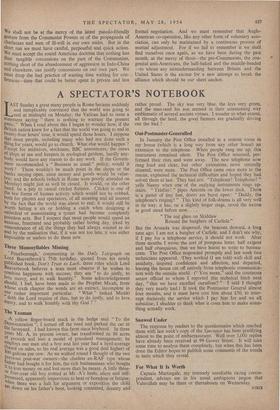Out - Postmaster-Generalled In January the Post Office installed in a remote
room in my house (which is a long way from any other house) an extension to the telephone. When people rang me up, this instrument remained silent. The Post Office returned, per- formed their rites and went away. The new telephone now rang loud and clear, but other extensions, more centrally situated, were mute. The Post Office came once more to the rescue, explained the technical difficulties and hoped they had solved them at last. They had not. "Telephone! Telephone! " yells Nanny when one of the outlying instruments rings up- stairs. " Telefon ! "pipes Antonia on the lower deck. There is a patter of tiny feet, doors are burst open: "Daddy, the telephone's ringing ! " This kind of folk-drama is all very well in its way; it has, on a slightly larger stage, stood the nation in good stead before now. . . .
"The red glare on Skiddaw Roused the burghers of Carlisle."
But the Armada was dispersed, the beacons dowsed, a long time ago; I am not a bdrgher of Carlisle, and I don't see why, if I pay for a telephone service, it should not work. After three months I wrote the sort of pompous letter, half exigent and half obsequious, that we have learnt to write to bureau- crats. The Post Office responded promptly and last week two technicians appeared. They worked (I am told) with skill and assiduity, inspired confidence and affection, and departed, leaving the house cut off entirely from telephonic communica- tion with the outside world. (" You mean,' said the courteous senior official to whom I reported this technical hitch next day, "that we have excelled ourselves?" I said I thought they very nearly had.) It took the Postmaster General almost four months, and it must have cost him about £50, to inter- rupt decisively the service which I pay him for and we all subsidise; I shudder to think what it costs him to make some- thing actually work.


































































 Previous page
Previous page